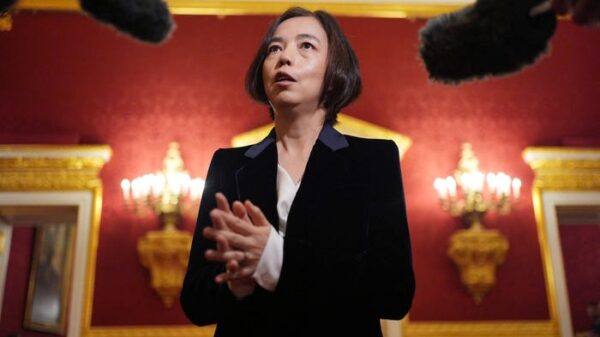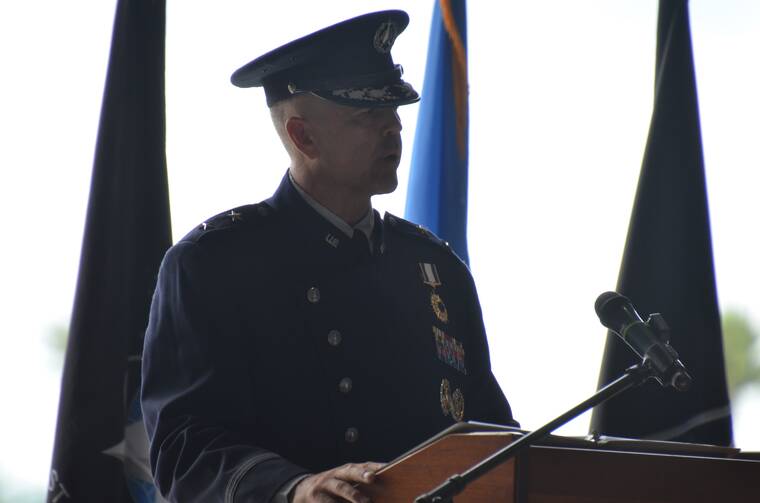The U.S. Space Force has officially marked a leadership transition in Hawaii, as Maj. Gen. Anthony “Chachi” Mastalir concluded his tenure on Friday at Joint Base Pearl Harbor-Hickam. In a change of command ceremony, Mastalir handed over leadership of the U.S. Space Forces Indo-Pacific to Brig. Gen. Brian Denaro. This ceremony comes after Mastalir’s three-year period overseeing the operations of the U.S. military’s newest branch across the Pentagon’s largest area of operations.
Mastalir was the inaugural leader of this regional command, which was established to enhance the management of space operations. Previously, Space Force personnel were directly under Air Force commanders. During the ceremony, Space Force Commandant Gen. Chance Saltzman praised Mastalir’s accomplishments, noting that he faced unique challenges in building the organization from the ground up. “I charged him to build concepts for space, enabling war fighting, formalizing exercises and war games to meet combat and command objectives,” Saltzman remarked.
The change of command coincides with a major exercise by the Department of the Air Force, which has mobilized 400 aircraft and thousands of troops across the Pacific and Indian Oceans. This exercise includes nearly 700 Space Force personnel, referred to as guardians, highlighting the growing role of the Space Force in military operations.
Mastalir reflected on his early days in command, likening the experience to the reality TV show “Survivor.” He recalled starting with limited resources and personnel, stating, “We had no real property, no kit, and no money. But what we did have was an idea: an idea that space is a war fighting domain of great consequence.”
The Space Force was established in December 2019 during the administration of President Donald Trump, a move that sparked considerable debate. With a global economy increasingly dependent on satellite systems for navigation and communication, the establishment of a dedicated military branch aimed to ensure the security and operational integrity of these assets.
International treaties exist to prevent the militarization of space, yet the definitions of what constitutes militarization remain contentious. Despite this, many nations utilize satellite technology for military purposes, developing capabilities such as anti-satellite missiles and communication jammers. The importance of such technologies has been underscored by recent conflicts, including the use of Starlink satellites by the Ukrainian military to enhance communication during their fight against Russian forces.
Mastalir’s previous experience included oversight of space operations in the Middle East, supporting military efforts against ISIS and managing critical operations during the chaotic evacuation from Afghanistan in 2021. He emphasized the absence of a formalized structure upon his arrival in Hawaii, stating that his mission was vital and rapidly expanding. “We had no predecessor, no war fighting doctrine, no assumed battle rhythm, no precedent, just a mission,” he noted.
In the Pacific theater, the military’s reliance on space systems is particularly pronounced. Saltzman explained that “the vast oceans and limited land masses of the Pacific make for a uniquely challenging operational environment.” Proponents of forming the Space Force argued that the significance of satellite systems warranted a separate entity dedicated to managing and protecting them against potential threats.
Mastalir’s tenure also involved fostering relationships with allied forces, an essential aspect of ensuring regional security. He noted that the Space Force serves as a crucial link for allies, stating, “We work here, we live here, we share the same security environment. Presence is a necessary precondition to building trust.”
Brig. Gen. Brian Denaro, who takes over command, brings significant experience in the Pacific, having spent much of his career focused on the region. He expressed a strong connection to Hawaii, where his children were born. “Hawaii indeed holds a special place in our hearts,” he said. Denaro emphasized the importance of the Space Forces Indo-Pacific, stating, “This is a critical time. These are critical threats. In this vast Indo-Pacific region, where distances are great and stakes even greater, Space Forces Indo-Pacific will remain the mighty watchful eye.”
As the Space Force continues to evolve, the leadership transition in Hawaii marks a pivotal moment in the ongoing development of U.S. military operations in space, highlighting the increasing importance of space as a domain of warfare.





































































